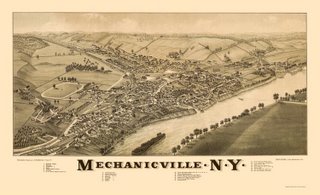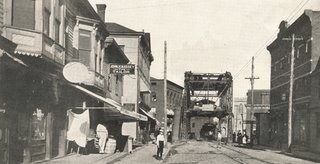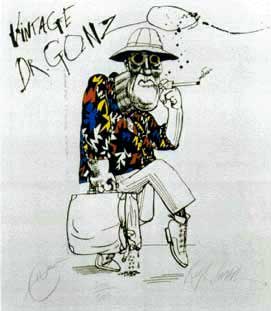Fast Food Nation
 This just in from the city of Mechanicville: McDonald’s will be closed for three months, sending waves of shock and disbelief throughout the community; area youths fear the coming months with no place to congregate and gorge on Happy Meals. And seniors, well they’re just addled by the news.
This just in from the city of Mechanicville: McDonald’s will be closed for three months, sending waves of shock and disbelief throughout the community; area youths fear the coming months with no place to congregate and gorge on Happy Meals. And seniors, well they’re just addled by the news.It’s truly a sad commentary when one of three dozen a McDonald’s located within a 20-mile radius closes and the community goes into shock. It’s an even sadder commentary when the closure is only temporary and the community still goes into shock. But such is apparently the case in this post-industrial ghost city as the fast food restaurant undergoes renovations this fall, according to an article in Wednesday’s Times Union.
Apparently, many among Mechanicville’s dwindling populace find daily solace underneath the bright yellow and red hues emanating from the golden arches. Located centrally within the city and on the bus path, seniors would meet there for cheap coffee in the morning, while the city’s youth used the locale as a place to meet up for a quick afternoon fat-fix.
 Since the closure, life in Mechanicville has clearly taken a turn for the worse and appears to be heading further down hill, as one could naturally expect. Abruptly weaned from the supple teat of fast food culture, the city’s teens are now congregating in greater numbers at the library. And faced with a roving band of elderly refugees, a city social worker is now hosting morning coffee socials at the Community Center; oh the horror.
Since the closure, life in Mechanicville has clearly taken a turn for the worse and appears to be heading further down hill, as one could naturally expect. Abruptly weaned from the supple teat of fast food culture, the city’s teens are now congregating in greater numbers at the library. And faced with a roving band of elderly refugees, a city social worker is now hosting morning coffee socials at the Community Center; oh the horror.After reading about these repercussions, one is left to wonder what would have Mechanicville done had McDonald’s never opened in the first place on the stark paved landscape of Park Avenue. What would sort of entity would have blossomed in its place?
Like it or not, fast food restaurants are now a pillar of American culture, where urban folk are prone to gather in absence of public funding for community centers or expand the hours of the library. Often times, these are areas of tight budgets that are first cut so that local politicians can claim to have level-funded budgets and property owners save an extra $100 a year in taxes.
But as Mechanicville’s leaders try to forge a prosperous future for the burned-out hulk of city perhaps a lesson can be learned by the temporarily shuttered McDonald’s. No matter how you look at the picture, businesses don’t build communities; rather, they are often products of a vibrant community.
 It’s something to be considered around budget time, when the area’s public facilities are likely to be the first to go on the chopping block. After all, there aren't too many people out there that decide to move to a city based on whether or not there’s a McDonald’s nearby.
It’s something to be considered around budget time, when the area’s public facilities are likely to be the first to go on the chopping block. After all, there aren't too many people out there that decide to move to a city based on whether or not there’s a McDonald’s nearby.


1 Comments:
It is a sad state of affairs when people depend upon businesses for community centers. It says something about our culture that we have fewer and fewer of these "common grounds" that are not shops like McDonalds or Uncommon Grounds. Businesses are great in providing jobs and adding to a community's tax base, but Horatio is right in saying that businesses should be additions to a vibrant community, not the building blocks. The message is simple when there isn't a viable place to socialize without paying something: you have no right to exist or congregate unless you pay the piper, no matter who is playing the damn music.
And I ask for your vote on November 7th.
Mayor McCheese
Post a Comment
<< Home